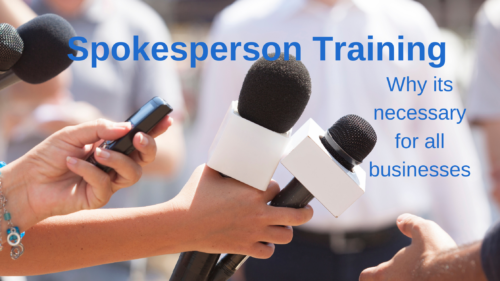Much like in the movies, actors are more popular than those working behind the scenes who created the characters and the script, to bring to life the plot into the big screen. People will always remember them, especially their explosive scenes and dialogues. They make or break the movie.
In the corporate sphere, it’s pretty much the same way when it comes to the role of a spokesperson, which at times is delegated to the company CEO. She or he becomes the brand’s face and voice, with the power to create a blockbuster business or a dismal flop.
Behind the scenes, this same spokesperson could be part of the company’s communications, marketing or PR team, or an experienced PR practitioner, working to create an effective media and marketing campaign, a social media management plan or even an effective crisis management plan, in case it is needed.
Given the magnitude of the spokesperson’s influence in creating a general perception about the company, its products or services, this person should be well-prepared for the job like a good soldier that can manoeuvre its way in a combat zone or in case of an attack. The goal is to win the battle.
It’s not an easy job and certain characteristics must be learned and developed to make the spokesperson credible.
First, integrity and honesty must be established. Does the spokesperson appear credible, convincing and believable? This person must know by heart what he or she is talking about, particularly specifics about the company’s line of business.
Second, can this person handle critical, emotive or suggestive questions that may be fired off during a press conference, product launch or any other company-sponsored major event? Can she or he handle the heat and keep composure when tough questions are asked?
Third, how knowledgeable is this person in answering tricky technical questions? What about the legal implications of the information disseminated or shared with the public, do they know their responsibilities and boundaries?
Public trust and perception are always at the core of any business and these require adequate training, particularly for a company spokesperson, to raise your company profile, create harmonious relations with the media and the public, or even in securing additional seed capital or investments.
A well-trained spokesperson should be able to convey the right message to the public and build the company’s reputation through verbal and written words.
Industry experts agree a spokesperson should undergo extensive communications training which generally involves the following: understanding verbal and non-verbal communication dos and don’ts; learning the use of bridging statements to control the direction of the interview; developing key points to send across when disseminating information; speaking clearly and succinctly the information being conveyed, among other things.
You may be an expert in what you do but there are sometimes circumstances that may throw you off balance. Some journalists may purposefully trick you or ask difficult questions to force you to reveal something that you’re not supposed to disclose. How do you handle this situation?
Proper training will prepare you for such situations for different types of media—print, TV, digital, or radio. Each medium has different sets of disciplines and it’s very important that your spokesperson convey the message confidently and honestly.
In our fast-moving and interactive world where everything is interconnected, your brand’s identity and reputation matter a lot. Having the right thing to say, when to say it, and how to say it, creates an impact.
Remember, it only takes one bad interview to ruin a reputation. But having the right training for your spokesperson maximizes opportunities, build trust for the company in the marketplace, bridge relations with the media and the public, ultimately, giving you that edge for more business growth.
Oh! and lest we forget, this also prepares you for your investor pitches if you are a startup. Did you want to know more, ping us an email and we can help you.



